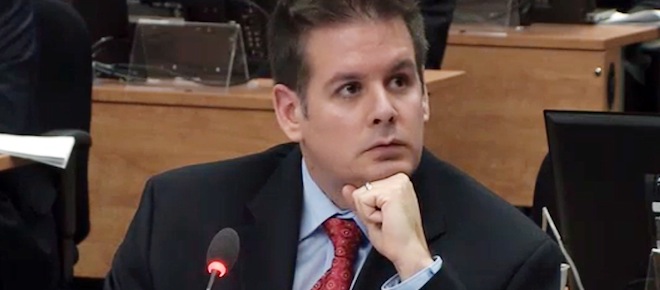Charbonneau and the eternal conundrum of truth-seeking commissions
Martin Dumont’s on-tape confession highlights the steamroller-like nature of the Charbonneau commission
Justice France Charbonneau questions retired City of Montreal engineer Luc Leclerc testifies before the Charbonneau Commission looking into corruption in the Quebec construction industry Monday, November on this image taken off television 12, 2012 in Montreal. THE CANADIAN PRESS/Paul Chiasson
Share

Martin Dumont, it can be said, probably ended the career of Montreal Mayor Gérald Tremblay. Dumont’s testimony at the Charbonneau Commission, the two-year investigation into the province’s construction industry, stripped the last shred of plausible deniability from the beleaguered and befuddled mayor. And Dumont, a former organizer with Tremblay’s Union Montréal party, did it with aplomb, indulging the commission with tales of cash-stuffed envelopes handed to him by a known mobster as they urinated next to each other; of a safe in Union Montréal’s office so crammed with ill-gotten booty that Bernard Trepanier, the party’s lead fundraiser, needed help to close it; of a put-upon Union Montréal secretary who was made to count some $850,000 in cash donations to the party.
Worse still, the mayor apparently knew about it all and more: Dumont said he was in the room in 2004 when Trepanier said Union Montréal had two sets of books, one official and one to keep track of the illegal donations piling up in party offices. “I don’t have to know about this,” Tremblay said, according to Dumont. Tremblay had withstood roughly five years of bad headlines; Dumont was one too many. The mayor resigned six days after his testimony.
Dumont, though, lied to the commission. Or at the very least he contradicted himself so badly that most of what has flowed from his mouth, up to and including that peach of a tale about a willingly ignorant Gérald Tremblay, has been cast into doubt. Yesterday, commission lawyers presented videotape of Dumont telling investigators that his bit about the secretary forced to count $850,000 in illegal cash donations didn’t happen. “That episode is false,” Dumont told investigators on December 11. “It was a lie on my part.”
The on-tape admission highlights the shortcomings of the steamroller-like nature of the Charbonneau commission. Witness testimony has been taken as the gospel truth, and the witnesses themselves—many of whom, like Lino Zambito, have admitted to fraud and the like—have been treated like whistle-blowing heroes. Wary of the rampant corruption within government ranks, Quebecers want blood, and these witnesses gave it to them. And though they and their testimony are vetted by commission investigators, Dumont shows the limits of this process. And he has hurt the credibility of the commission as a result.
It is the eternal conundrum of truth-seeking commissions such as Charbonneau. By their very definition, they rely significantly on the testimony of people who have fallen from grace in one form or another. Among municipal politico types, anyway, Dumont reputation was known. In 2010 Dumont, on the outs with Union Montréal, presented himself to Projet Montréal as a potential candidate for the party in Pointe-Aux-Trembles. Projet Montréal is a left-wing party in power in Montreal’s artsy, insular, horn-rimmed Plateau district—known derisively as “The People’s Republic of the Plateau”—and having a former Union organizer as a candidate in the far-flung borough of Pointe-Aux-Trembles would have been a coup. Projet leader Richard Bergeron desperately wanted Dumont, but Projet Montréal councillor Alex Norris, who knew of Dumont, fervently objected. Norris won out; suffice to say, the councillor was thanked profusely by members of his party for having saved his party’s reputation when word of Dumont’s duplicity leaked out late last year.
Dumont also worked for several federal ministries. In one incarnation, he was chief of staff to former Conservative Minister Josée Verner. As TVA recently reported, Dumont racked up more than $46,000 in travel expenses over 10 months—double what Verner charged during the same period. The spectre of losing face was apparently too much for Dumont. On December 11, hours after he met with commission investigators, he was hospitalized for undisclosed reasons.
Dumont’s manufactured yarn about the $850,000, meanwhile, has hurt the commission’s reputation in another way. His lawyer, Suzanne Gagné, managed to at least cast doubt on the manner in which Dumont’s confession was attained. Strictly speaking, lawyers for witnesses aren’t allowed to cross-examine their clients accusers; the commission is a truth-finding exercise, so the argument goes, not a court of law. Yet after an acrimonious exchange with Judge France Charbonneau, during which she evoked the apparent wrongs done to her client’s fundamental rights, the judge allowed Gagné to do just that.
Among the bits of information she harvested from commission investigator Robert Pigeon during this cross-examination: that Dumont was compelled by subpoena to appear in front of them—even though “He could leave whenever he wanted,” said Pigeon; that Dumont wasn’t allowed to speak with his wife, a former City of Montreal adviser, who was being interrogated in the next room; that there was a general threat of menace toward Dumont throughout what Pigeon had earlier characterized as a friendly chat.
What lasting effect will Dumont have on the commission? After all, his testimony brought down a mayor. While Gérald Tremblay arguably should have stepped down anyway, given his canny ignorance of the goings on in his own administration, we now know he did so largely as a result of an admitted liar. As a man willing to lie under oath and embarrass the very people who got him to admit to it, Dumont is a perfect nightmare, for the commission and for its targets.